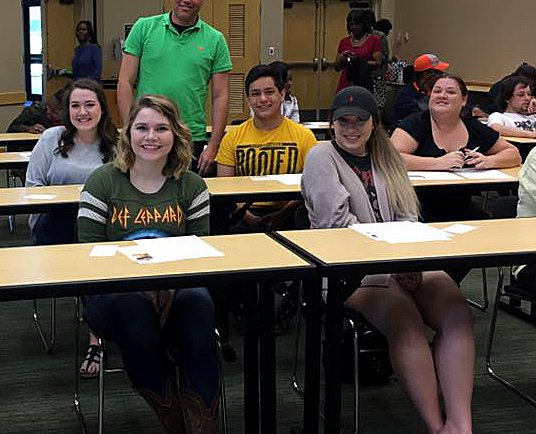1237Views
Colleges reveal results of economic impact study Mississippi Governor Tate Reeves spoke during yesterday's press conference revealing the results of the community college system's economic impact study.
Mississippi's 15 Community College presidents gathered at the State Capitol with data proving the two-year college system is valuable to the state in numerous ways. They commissioned an economic impact report by NSPARC, or the National Strategic Planning and Analysis Research Center at Mississippi State University to analyze the more than 100-year old community college system to determine who is served by the statewide network, the outcomes in relation to the labor market and the estimated overall economic impact on the state.
Community college leaders discovered the system is overwhelmingly successful. The report found community colleges have a 3.9-billion-dollar impact on the economy, serving more than 200,000 people annually in academic and workforce training. Additionally, the two-year college system is one of the largest employers with 8,100 employees.
"Community colleges generate 277 million dollars in state and local taxes," said Dr. Mary Graham, chair of the Mississippi Association of Community and Junior Colleges (MACJC) and President of Mississippi Gulf Coast Community College. "The state's investment in your community college has an immediate and short-term payback for all the citizens of Mississippi. Imagine if we invest in Mississippi's community colleges to the fullest extent? What a difference we can make for all of the citizens of Mississippi."
With more than 52 thousand unfilled jobs in Mississippi, community college leaders believe they are the answer to preparing students to fill those highly skilled, high paying jobs. In fact, Governor Tate Reeves announced his plan to invest 75 million dollars into community colleges, of the 100 million he has allocated in his plan to equip Mississippians with the necessary skills for a modern workforce and to make Mississippi a "ready to work" state.
"Every class offered at our community colleges is in and of itself, workforce development and workforce training. Jobs or university degrees-it is all opportunity in workforce development," said Governor Reeves. "I'm committed to helping our community colleges and more importantly, the institutions and the students they serve, to achieve even more together to better our workforce training, and create good-paying jobs for every Mississippian so they can thrive at home."
That is continued good news to community college leaders with graduation rates at community colleges at an all-time high and 75% of its graduates stay "home" in Mississippi. The Community College Economic Impact Report also revealed the value of an Associate of Applied Science degree within a few years of graduation, is very appealing to residents said MACJC Legislative Co-Chair and President of Jones College, Dr. Jesse Smith.
"The average salary for graduates with an A.A.S. degree is above $40,000 which is equivalent to most university grads with a bachelor's degree," said Smith. "For every person who went through workforce training, after one year, they saw their income increase by $2,300. We (community colleges) trained 100,000 people last year. Think of that economic impact in and of itself."
Some of the benefits the Report revealed didn't tie directly to the state economy or an individual's financial success. Dr. Andrea Mayfield, Executive Director of the Mississippi Community College Board explained employers greatly benefit from workforce training at community colleges.
"There are also some benefits that you don't hear very often, like lower reliance on public assistance, higher employee retention for companies through workforce training, higher workforce productivity, lower likelihood of being injured on the job due to safety training through workforce services and more. There is a financial impact and a return to the state. All of these things add up and have value. Community College's truly are the economic powerhouse for the state," said Mayfield.
Despite the data or empirical evidence discussing the return on the investment of community colleges on the state economically, the President of the Mississippi Faculty and Staff Association and East Mississippi Community College English instructor, Marilyn Ford said the data represents far more to her. She sees her students, their dreams, aspirations and hope for a better future.
"I don't see the numbers or percentages when I enter a classroom. I see my kids, my students, who have hopes and dreams for our state and for ourselves. Our two-year colleges cannot continue to function with any degree of efficiency; we can't help the Molly's, the Lily's, the C. J.'s, that I see every day, every week. We need your help to continue our mission to serve our communities and those communities are comprised of living and breathing, hopeful Mississippians," said Ford in her appeal to the Legislature for more funding.
The 15 Community College statewide system offers more than 500 locations throughout the state, including military bases and high schools, for residents to earn college credit and non-credit training. Providing accessible education and training is one of the many reasons the Mississippi Community College Impact Report indicates to community college leaders they are on the right track.
Maximizing the state's return on its investment in the community college system is helping the state and its residents with more pathways to financial and personal success.


